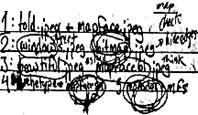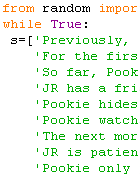 I am pleased to announce the launch of Story Generation(s) at PW10 Performance Writing Weekend at Arnolfini, Bristol, May 8-9, 2010. Story Generation(s) are a series of short fictions generated by Python scripts adapted (with permission) from two 1k story generators written by Nick Montfort: http://grandtextauto.org/2008/11/30/three-1k-story-generators/ .
I am pleased to announce the launch of Story Generation(s) at PW10 Performance Writing Weekend at Arnolfini, Bristol, May 8-9, 2010. Story Generation(s) are a series of short fictions generated by Python scripts adapted (with permission) from two 1k story generators written by Nick Montfort: http://grandtextauto.org/2008/11/30/three-1k-story-generators/ .
I began tinkering with these story generators in June 2009. There are currently three stories in the series: Excerpts from the Chronicles of Pookie & JR, I’ve Died and Gone to Devon and Auto-Autobiography. This will be their first public exhibition.
Excerpts from the Chronicles of Pookie & JR documents my adventures with Ingrid Bachmann’s hermit crab Pookie, also known as Pookie 14, during June of 2009. Of Excerpts from the Chronicles of Pookie & JR, Nick Montfort writes:
“J. R. Carpenter, author of Words the Dog Knows, Entre Ville, The Cape, and other fine works of e-lit, print, and xerography, has delightfully re-purposed one of my 1k story generators to have it tell stories involving her and a hermit crab named Pookie. The program has grown to about 2k, but it uses the same simple (and surprisingly effective) method as my first generator does: It simply removes all but 5-9 sentences from a sequence, eliding some of what’s been written. Sometimes the reader is left to wonder who the hermit is.” Nick Montfort, http://nickm.com/post/2009/07/story-generation-with-pookie-and-jr/
In July 2009, NYC-based artist/programmer Ravi Rajakumar ported the Python script into Javascript to create this web browser friendly version of the Chronicles of Pookie & JR: http://luckysoap.com/pookieandjr/index.html
Here’s a screenshot from the Rajakumar iteration:

DOWNLOAD PookieAndJR.py
I’ve Died and Gone to Devon re-purposes the same Python script as Excerpts from theChronicles of Pookie & JR to tell (and retell) the story of an arrival and first impression of Devon. Most of the sentences in this story were adapted from Twitter posts written during a five-week visit to Devon, August – September, 2009.
Here is one example of a story generated byI’ve Died and Gone to Devon:
I’ve died and gone to Devon.
In North America, roads this narrow wouldn’t even count as driveways.
If this is the wrong side of the road, I don’t care what’s right.
If this is the driveway, then I can’t wait to see the house.
We can’t hear the river from the house, but we can see it.
Everybody insists we’re by the seaside. I can smell but not see the sea.
Flotsam on a tidal river is a strange mixture of oak leaves and seaweed.
This is an achingly beautiful place to come across a little death.
DOWNLOAD Devon.py
Auto-Autobiography adapts a different Python story generator script by Montfort to generate a quasi-autobiographical story by segments. This script chooses sentences from pools of stock autobiographical statements: “I was born…” I come from…” “In retrospect…” This format was suggested to me by a passage from Anne-Marie MacDonald’s novel, As The Crow Flies:
“If you move around all your life, you can’t find where you come from on a map. All those places where you lived are just that: places. You don’t come from any of them; you come from a series of events. And those are mapped in memory. Contingent, precarious events, without the counterpane of place to muffle the knowledge of how unlikely we are. Almost not born at every turn. Without a place, events slow-tumbling through time become your roots. Stories shading into one another. You come from a plane crash. From a war that brought your parents together.”
Anne-Marie MacDonald, As The Crow Flies, Toronto: Knopf, 2003, page 36.
The notion of autobiographical veracity is undermined in Auto-Autobiography, by leaving key gender signifiers such as Mother/Father to computational chance.
Here is one example of a story generated by Auto-Autobiography:
Here is my story:
I was born in wedlock – for some reason, this surprises me.
I come from a war that brought my parents together.
My mother had a long memory and a short fuse.
I live in a wonderful house.
I work hard at not having to work too hard.
I wish I’d said that differently.
My best friend kept insisting I learn to play guitar.
In retrospect, she read way too many Russian novels.
I love it when we lie in bed plotting the downfall of our enemies.
Next year, let’s forget every single thing we learned this year.
In future, we will know many beginnings and no ends.
DOWNLOAD autobio.py
Viewing Instructions:
Download the python file to your desktop and unzip. On a Mac or Linux system, you can run the story generator by opening a Terminal Window, typing “cd Desktop”, and typing “python filename.py”. Hint: look for Terminal in your Utilities folder. These Python story generator runs on Windows, too, but you will probably need to install Python first: version 2.6.5. Once Python is installed you can double click on the file and it will automatically launch and run in the terminal window. Every time you press ENTER a new version of the story will appear.
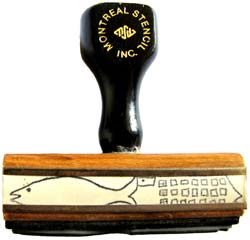
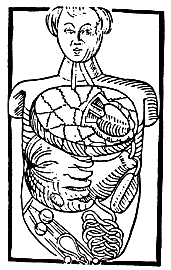



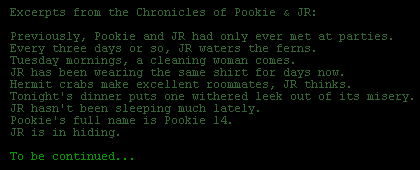



 I’m headed to Ottawa for a few days to do a
I’m headed to Ottawa for a few days to do a 
